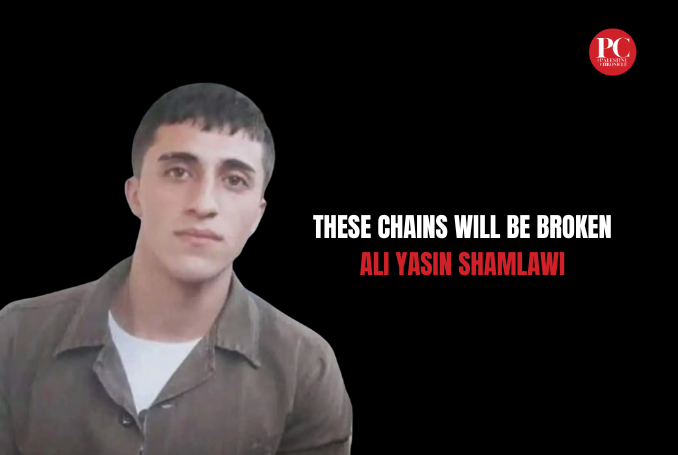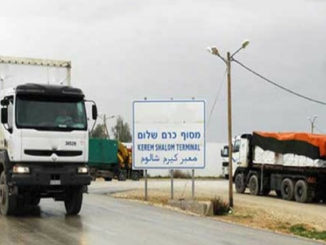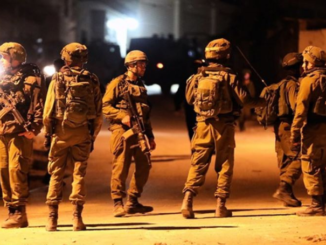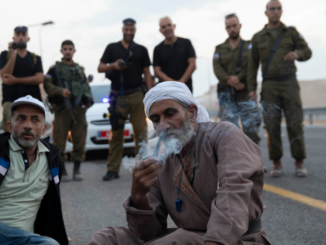
Starting on Friday, November 24, a prisoner swap between the Palestinian resistance and Israel began in stages. So far, 150 Palestinian prisoners have been released from Israeli prisons.
To provide some context, The Palestine Chronicle will publish stories of Palestinian prisoners included in Ramzy Baroud’s volume ‘These Chains Will Be Broken: Palestinian Stories of Struggle and Defiance in Israeli Prisons’. (Clarity Press.)
The text below appeared in a chapter entitled ‘The Boy from Haris’.
Ali Yasin Shamlawi – Narrated by his Mother, N’imeh Shamlawi
On March 17, 2013, Ali Yassin Shamlawi was detained with four other Palestinian teenagers from the village of Haris, near the city of Salfit in the central region of the Occupied West Bank. Ali, along with Mohammad Klaib, Tamer Sof, Ammar Sof and Mohammad Suleiman, became known as the ‘Haris boys’ as their arrest, torture and trial captured national and international attention, especially as they spent three years in detention, later to be tried and sentenced as adults.
Ali was only 16 when Israeli soldiers detained him, along with the other boys. The five were accused of throwing rocks at a vehicle belonging to Israeli settlers from Ariel, a Jewish-only settlement built illegally on ethnically cleansed Palestinian land. The Israeli driver claimed that the boys threw rocks at the vehicle, causing a car accident that resulted in the injury of an Israeli child, Adele Biton.
The Israeli military court discounted the testimony of Palestinian witnesses and only upheld the account of the Jewish settlers. The ‘Haris boys’ maintain their innocence to this day. Ali told the human rights organization, Defense of Children International-Palestine, that he only confessed to throwing stones under torture and during a prolonged period of solitary confinement.
Ali was initially held in al-Jalama, a notorious Israeli military detention center near the city of Haifa, built atop the ruins of a Palestinian village that was depopulated and destroyed in 1948. There, Ali was tortured for 22 days. Despite being a minor at the time, Ali was not allowed to communicate with anyone, not even a lawyer, except for his Israeli interrogators. After the forced confession, Ali, along with the other ‘Haris boys’, faced a trial consisting of more than 60 different sessions, where he was finally sentenced to 15 years in prison. Throughout the duration of the trial, he was held in Megiddo Prison for two years, before he was moved to the Ramon Prison and finally to the Naqab (Negev) Desert Prison, where he is currently serving his long sentence.
Soon after his arrival, Ali signed up for classes at Al-Quds Open University. where he is now pursuing a bachelor’s degree.
Ali was only allowed family visitation after six months following his initial imprisonment.
The Boy from Haris
I took my seat on the bus next to my husband. It was the first time I was allowed to see my son, Ali, six months after his arrest. The bus belonged to the Red Cross, and all the passengers were families like us from the Salfit region in the West Bank.
The journey began at 6:30 in the morning. We arrived at the Qalqilya military checkpoint about 45 minutes later. However, we were held at the checkpoint for nearly two and a half hours. We were all thoroughly searched and humiliated. The soldiers yelled at us, insulted us with profane language, delayed us for no reason and then searched us, all over again. We remained composed, because every parent on that bus was consumed with the hope of seeing their child. Nothing but Ali was on my mind. I tried to imagine the moment I would see him. What should I say? What if I break into tears? How can I leave without him?
When I saw him at the Salem military court a few weeks after his initial arrest, in March 2013, I wanted to cry, to scream. My heart sank when they brought him in – my son, my 16-year-old boy and the youngest and most spoiled of all of my children. He stood there, bewildered, handcuffed and shackled. He looked scared. Exhausted. He had lost so much weight. I was not allowed to talk to him, to touch him, to hug him. Still, I held my tears, along with that muted scream that I could only let out when I returned home. I gestured to him from afar and shouted “Stay strong, son. God is with us!”
Our bus journey lasted another hour before we reached the Megiddo prison, where Ali was held briefly after the end of his torture and interrogation. We were dropped at a large, caged space with a massive electric gate. We waited there for two more hours. I had in my purse some money to deposit in his prison account so that he could purchase a few necessities from the prison’s canteen. I also had a duffle bag with a few items of clothing that had to adhere to the specific prison instructions of being of a certain color, fabric and count.
The soldiers then divided us into groups. We were listed in the first group that was called to enter. First we had to be corralled before more electronic gates and subjected to further physical searches. Finally, we arrived at a rectangular visitors’ hall with wooden chairs lined up before a wall. The separation wall was made of cement, upon which massive slabs of thick, impenetrable glass were erected. By each chair there was a phone handset, and a corresponding handset on the other side. We waited for another 15 minutes. Against one side of the wall, families, mothers and fathers stood, as they fought their tears, some beseeching God for mercy and waiting desperately for the doors on the other side to open.
Then, he arrived. Ali. My sweet, sweet boy. He had this excited look on his face, his eyes giddily searching the crowd on the other side of the glass wall for us. You could see the joy on his face when he saw me with his dad. I was so eager to hug my child, I would have broken the glass and held him in my arms, to never leave without him. I knew that my embrace would wash away the months of torture, humiliation and fatigue. I pitied him. I pitied myself and my husband, as the three of us stood there in a sea of emotion, tears, eager to break free, and the determination to remain strong and steadfast.
I quickly grabbed the phone handle. “Darling. Habibi. How are you?” I started. But his voice arrived faint and hardly audible. I could barely hear him. I kept asking him to raise his voice, to repeat what he had said. His father took the phone from me and began instructing Ali: “Stay strong, my son. Now you are a man. Circumstances forced you to grow older beyond your years, and you must meet the challenges of life head-on.” Ali tried to assure us that he was fine; he said that he had many friends, and that comrades in prison were looking after him. We told him how proud of him we were, that all of Haris, all of Salfit, in fact, all of Palestine was proud of him. He asked us about his friends at school, his teachers and neighbors as, for a fleeting moment, he wanted to feel that everything was just fine. Every time he would mention the name of any of his four brothers, his eyes would tear up. But when he mentioned his only sister, to whom he was very close, he paused. Tears rolled down his face. “Tell her I love her,” he said.
We spent 45 minutes with him. It was not long enough. It was so difficult for me to walk away. I felt that my heart was being ripped out of my chest. Who will take care of my son for the next 15 years? Who will comfort him during his moments of pain? Who will look after him when he is sick? Then I broke down, crying. I had done so well till that moment, but as the soldiers dragged him back to his cell, all of my strength suddenly vanished. I felt as if my heart had broken into a thousand pieces.
I count the days to see him free once more. Whenever a prison comrade of his is freed, I rush with my husband to visit him and seek news of Ali. “You must be proud of your son,” they always tell us. “You raised a kind and polite son,” they say. When Ali was first arrested, he was a child. Others looked after him. It has been nearly six years. Now, he looks after and comforts others. My boy is now a man, and a good-hearted one. He is also keeping up with his studies. He should graduate from university soon. When he fully serves his sentence, he will be 31 years old.
Ali was unjustly imprisoned. All the ‘Haris boys’ were.
I think of my little boy every waking hour.








